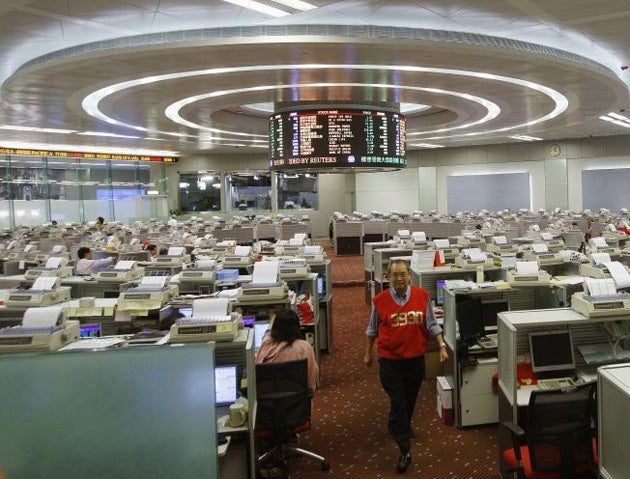Crash! Shares tumble as Lehman Brothers collapses and fears grow for AIG

A global banking crisis was last night threatening to spiral out of control, and frantic US officials were locked in talks to save one of the world's biggest insurance companies just a day after they let one of its most powerful investment banks go to the wall.
Emergency talks on the future of AIG, which has operations across the globe and is deeply enmeshed in the world's financial markets, continued all day with no resolution, causing panic selling on the stock market.
Investors were already reeling from the collapse of Lehman Brothers on Sunday night and the fire sale of its bigger rival, Merrill Lynch, events which will reshape the finance industry forever. Images of Lehman employees in New York and London leaving buildings yesterday with belongings packed in cardboard boxes may become a defining image of the credit crisis.
Lehman employs 4,500 people in London and 20,000 more around the world, and the human cost of its bankruptcy was the first and easiest to measure. Many employees have most of their wealth tied up in its shares, which are now worthless.
But there are other costs from the past four days, and the reckoning has only just begun. The FTSE 100 collapsed by 4 per cent yesterday. And as panic selling spread during the afternoon on Wall Street, the Dow Jones Industrial Average of leading US shares ended down over 500 points, setting up for another weak opening in London this morning. AIG – which sponsors Manchester United football club – was pleading for $40bn in US government help to stave of its collapse, and advisers were working on emergency assets sales.
America's central bank, the Federal Reserve, was pressing for Wall Street firms to make bridging loans available, rather than providing government money. The company's regulator in New York said AIG would be allowed to dip into supposedly ring-fenced funds to reach $20bn of extra cash, if necessary.
Meanwhile, investors were still absorbing the news that Merrill Lynch, which employs 60,000 people, is no longer an independent company, after an emergency takeover by Bank of America.
The implosion of some of the most powerful financial firms in the world is the culmination of over a year of turmoil in the credit markets, turmoil that has its roots in the collapse of the US housing market.
Many economists fear that, without a resolution soon, the global economy could be sent into a deep recession. The dollar tumbled in value yesterday and the oil price skidded below $100 a barrel, both signs that traders fear an economic slowdown.
The City of London bore the brunt of the storm yesterday, as bankers braced for more job cuts, not just at the firms directly affected by the weekend meltdown but across the industry, which must now beginning shrinking dramatically after years of excess. There was near-panic trading in shares of HBOS, the UK banking group which owns Halifax, the country's largest mortgage lender, which lost 35 per cent of its value at the worst point of the day. It ended down 18 per cent, and Barclays and Royal Bank of Scotland also posted double-digit percentage falls. In the US, Ken Lewis, head of Bank of America, said he thought that up to half of the country's 9,000 banks would ultimately go under or be taken over.
The problems in the derivatives markets could be even larger. Lehman's bankruptcy triggered a scramble by traders on both sides of the Atlantic to unwind an estimated $700bn of trading positions, something never tried on such a scale. The growth of the derivatives market has been so fast and so vast that Wall Street has not had time to invent a central trading mechanism and the whole edifice has gone largely unregulated.
In co-ordinated moves, the Bank of England and the European Central Bank injected a combined £28bn of new lending into the markets to help ease any bottlenecks. The US Federal Reserve has also relaxed its rules for lending, and ten Wall Street banks said on Sunday night they were creating a $70bn fund to make temporary loans to institutions in difficulty.
Out on the US presidential election trail, Barack Obama blamed eight years of lax regulatory oversight for "the most serious financial crisis since the Great Depression". His rival, John McCain, said these were "frightening times" and vowed "to clean up Wall Street". President George Bush, meanwhile, called for calm, saying the economy was strong enough to withstand "adjustments" on Wall Street.
Hank Paulson, the US Treasury Secretary, blamed Wall Street for bringing the crisis on itself, and he called for a sweeping overhaul of financial regulation to prevent similar threats to global stability in the future.
Subscribe to Independent Premium to bookmark this article
Want to bookmark your favourite articles and stories to read or reference later? Start your Independent Premium subscription today.

Join our commenting forum
Join thought-provoking conversations, follow other Independent readers and see their replies